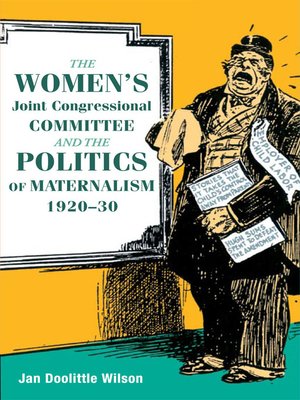The Women's Joint Congressional Committee and the Politics of Maternalism, 1920-30
ebook ∣ Women, Gender, and Sexuality in American History
By Jan Wilson

Sign up to save your library
With an OverDrive account, you can save your favorite libraries for at-a-glance information about availability. Find out more about OverDrive accounts.
Find this title in Libby, the library reading app by OverDrive.



Search for a digital library with this title
Title found at these libraries:
| Library Name | Distance |
|---|---|
| Loading... |
Jan Doolittle Wilson offers the first comprehensive history of the umbrella organization founded by former suffrage leaders in order to coordinate activities around women's reform. Encompassing nearly every major national women's organization of its time, the Women's Joint Congressional Committee (WJCC) evolved into a powerful lobbying force for the legislative agendas of more than twelve million women. Critics and supporters alike came to recognize it as "the most powerful lobby in Washington."
Examining the WJCC's most consequential and contentious campaigns, Wilson traces how the group's strategies, rhetoric, and success generated congressional and grassroots support for their far-reaching, progressive reforms. But the committee's early achievements sparked a reaction by big business that challenged and ultimately limited the programs these women envisioned. Using the WJCC as a lens, Wilson analyzes women's political culture during the 1920s. She also sheds new light on the initially successful ways women lobbied for social legislation, the limitations of that process for pursuing class-based reforms, and the enormous difficulties the women soon faced in trying to expand public responsibility for social welfare.
A volume in the series Women in American History, edited by Anne Firor Scott, Susan Armitage, Susan K. Cahn, and Deborah Gray White
| Contents Acknowledgments ix Introduction 1 1. The Emergence of the WJCC 000 2. The Lobby for the Sheppard-Towner Bill, 1921 000 3. Opposition to the State Campaign for Sheppard-Towner, 1921-23 000 4. The Crusade for the Child Labor Amendment, 1922-24 000 5. Allies and Opponents during the Battle for Ratification of the Child Labor Amendment, 1924 000 6. Defeat of the Child Labor Amendment, 1924-26 000 7. The Struggle to Save the Sheppard-Towner Act, 1926-30 000 8. The Impact of Right-Wing Attacks on the WJCC and Its Social Reform Agenda, 1924-30 000 Conclusion 000 Appendixes 000 Notes 000 Bibliography 000 Index 000 |"A important addition to our understanding of how 'alliances and divisions among women coexisted and were continually renegotiated, contested, and reconstructed through changing historical and social circumstances'. We see the strength of political connections through the WJCC and the failings of that strength when society turned against any group with a hint of Communist or social leaning,"—Journal of American History
"Wilson's account of the forces arrayed to counter progressive women's organizations constitutes a deeply satisfying rebuttal to recent 'rational choice' models of electoral and organizational politics after women won the vote. Recommended."—Choice
"The arguments are clearly articulated and all of the evidence is properly marshaled. . . . Scholars interested in early twentieth-century women's political history will find a wealth of information."—Historian
|Jan Doolittle Wilson is Wellspring Associate Professor of Women's and Gender Studies and History at the University of Tulsa.







